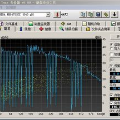The high demand for memory capacity in modern datacenters has led to multiple lines of innovation in memory expansion and disaggregation. One such effort is Compute eXpress Link (CXL)-based memory expansion, which has gained significant attention. To better leverage CXL memory, researchers have built several emulation and experimental platforms to study its behavior and characteristics. However, due to the lack of commercial hardware supporting CXL memory, the full picture of its capabilities may still be unclear to the community. In this work, we explore CXL memory's performance characterization on a state-of-the-art experimental platform. First, we study the basic performance characteristics of CXL memory using our proposed microbenchmark. Based on our observations and comparisons to standard DRAM connected to local and remote NUMA nodes, we also study the impact of CXL memory on end-to-end applications with different offloading and interleaving policies. Finally, we provide several guidelines for future programmers to realized the full potential of CXL memory
翻译:当今数据中心对内存容量的高需求引发了内存扩展和分离等多项创新。其中之一是基于 Compute eXpress Link (CXL) 的内存扩展,已经受到了重视。为了更好地利用 CXL 储存器,研究人员建立了多个仿真和实验平台来研究其行为和特征。然而,由于缺乏商业硬件支持 CXL 储存器,其全面的性能可能仍然对社区不为人知。在本文中,我们探索了 CXL 储存器在最先进的实验平台上的性能特征。首先,我们使用我们提出的微基准测试研究 CXL 储存器的基本性能特征。基于我们的观察和与连接到本地和远程 NUMA 节点的标准 DRAM 的比较,我们还研究了 CXL 储存器对具有不同卸载和交错策略的端到端应用的影响。最后,我们提供了一些指南,以便未来的程序员能够实现 CXL 储存器的全部潜力。



